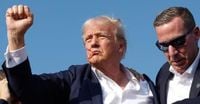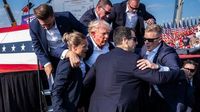Nearly a year after a harrowing assassination attempt at a Trump rally in Butler, Pennsylvania, the story continues to unfold in multiple arenas—from courtrooms to bestseller lists and even the silver screen.
On July 13, 2024, an attack at a campaign rally in Butler sent shockwaves across the nation. Bullets tore through the air, tragically killing volunteer firefighter Corey Comperatore and grazing then-presidential candidate Donald Trump's right ear. The assailant, 20-year-old Thomas Matthew Crooks, was shot and killed by Secret Service agents at the scene.
Among the witnesses was Salena Zito, a pro-Trump columnist and journalist for the Daily Signal. Having been mere feet from the chaos, Zito experienced the terrifying moments firsthand. She was tackled by a campaign staffer immediately after the shooting, an act that likely saved her from harm. The day following the incident, Trump himself called Zito seven times to apologize for missing a scheduled interview, expressing deep concern for her and her family. "I just want to make sure that you’re OK, that your daughter Shannon is OK, and I really want to apologize for not doing the interview," Zito recalled Trump saying. She added, "[Trump] talked deeply about faith, about purpose. I could tell he needed to work it out with someone who had been there." This glimpse into Trump's personal side after such a traumatic event adds a human dimension to a story often reduced to headlines.
Nearly a year later, Zito transformed her experience and extensive reporting into a book titled Butler: The Untold Story of the Near Assassination of Donald Trump and the Fight for America’s Heartland. Released on July 8, 2025, the book rapidly rose to prominence, debuting at No. 1 on The New York Times bestseller list during the week of July 14. It also secured a spot in Amazon’s top 10. The book explores not only the assassination attempt but also the broader perspectives of Middle America on Trump, while sharply criticizing what Zito describes as the Washington press corps's bias against the former president.
Her emotional reaction to the book's success was evident during a Fox News interview, where she admitted she "almost cried" upon learning of its bestseller status. Trump himself took to Truth Social to praise the book, calling it "powerful" and celebrating its successful launch. This endorsement from Trump has undoubtedly helped amplify the book’s reach.
Adding another layer to the story, a film adaptation of Butler was announced on July 16, 2025. The project is a collaboration between Zito and Pense Productions, with Brett Ratner slated to direct. The movie will not only cover the events in Butler but also delve into Zito’s career, providing a wider context to the narrative. While no lead cast has been confirmed, Zito joked that many suggest Marisa Tomei for the role, hinting at the film's potential to attract big-name talent.
Meanwhile, the legal and political fallout from the shooting continues. On July 12, 2025, just a day before the one-year anniversary of the attack, the conservative watchdog group Judicial Watch filed a lawsuit against the Department of Justice (DOJ) for allegedly violating the Freedom of Information Act (FOIA). The suit follows the DOJ’s refusal to release records related to the shooting and the shooter, Thomas Matthew Crooks.
Judicial Watch had submitted a FOIA request to the FBI on July 24, 2024, seeking all records related to Crooks and any communications between him and FBI officials, contractors, or assets. However, the FBI denied the request on August 5, 2024, and the DOJ’s Office of Information Policy rejected Judicial Watch’s appeal on August 21, 2024. The lawsuit demands that the court compel the DOJ to conduct a thorough search and produce any non-exempt records tied to the request.
Tom Fitton, president of Judicial Watch, expressed frustration over the delays, stating on July 14, 2025, "No more delays and excuses, the FBI should release what it has on the man who tried to kill President Trump a full year ago in Butler." The organization has also filed a similar lawsuit against the Department of Homeland Security earlier in March 2025. The DOJ has declined to comment on these legal actions.
Amid these developments, another controversy has stirred in Europe. German comedian El Hotzo is facing trial after making provocative jokes about the failed assassination attempt on Donald Trump, sparking international outrage. The comedian’s remarks have ignited a heated debate about the boundaries of free speech, with critics arguing whether such jokes cross the line into criminality.
The case highlights broader concerns about free speech double standards across Europe, the weaponization of legal systems to silence political expression, and even the criminalization of memes in Germany. These issues resonate beyond the courtroom, raising questions about the balance between protecting free expression and maintaining respect for sensitive political events.
Justin Stares and Alexandra Phillips, hosts of the Brussels Signal podcast, recently dissected the scandal and the upcoming trial, questioning whether "bad jokes can become crimes" and if El Hotzo’s prosecution represents an attack on free speech. They also touched on the ongoing trade tensions between Trump and the European Union, suggesting that political and cultural clashes continue to ripple across the Atlantic.
In this complex web of events, the story of the Butler shooting serves as a focal point for discussions about political violence, media narratives, legal transparency, and the limits of expression. From the raw trauma of that summer day in 2024 to bestselling books, courtroom battles, and cultural controversies, the incident remains a potent symbol of America’s deeply divided political landscape and the challenges it poses to democracy and free speech worldwide.
As the film adaptation moves forward and legal battles unfold, the nation watches closely, reminded that the repercussions of a single violent moment can echo far beyond the immediate tragedy, shaping discourse and policy for years to come.


